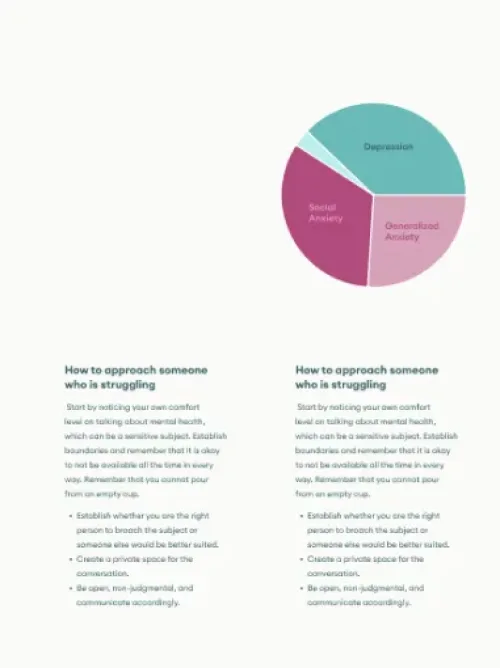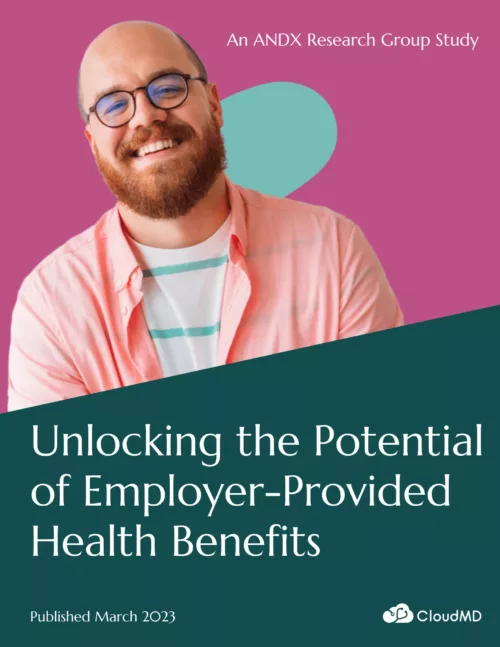You Asked, We Answered: Grief and Loss Q&A (Part One)

5 Minute Read
Understanding Your Own Grief
By Dr. Kayleigh-Ann Clegg, Clinical Psychologist
Every year, CloudMD offers monthly Ask an Expert webinars to its clients. I was fortunate to be able to present one of those webinars focused on grief and loss – what the grieving process can look like, how to move through it in healthy ways, how to manage the responsibilities that don’t seem to stop when it feels like your life has, and how to know when you might need more support. A big part of my clinical practice as a psychologist involves working with people who are grieving. It’s a topic that’s near and dear to my heart, and I was really glad to have the opportunity to talk about it.
I also really appreciated the questions that were asked – being open and honest about grief can help build grief literacy and, most importantly, help others feel a little less alone in the process. In that spirit, I’ve compiled some of the questions I wasn’t able to answer during the webinar below. This first part focuses on questions people asked about their own experiences with grief. In a future post, I will focus on questions about being there for others who are grieving.
As always, please note that this is general information based on my clinical experience and my reading of current research and does not substitute more personalized information specific to your situation.
Is it possible to experience grief for losses other than deaths?
Definitely. When we think of grief, we often tend to think of bereavement – what we experience when someone important to us dies. But grief can happen in response to any loss: a traumatic experience that shakes our sense of safety; the death of a beloved pet; having a child with significant physical or mental complications; being fired or laid off; financial loss; retirement; estrangement or the end of a friendship, romantic relationship, or family tie; aging; pregnancy loss; moving to a new place; chronic or sudden illness or injury; an empty nest; the loss of familiar ways of being and doing things; our dreams, hopes, or wishes for the future; and so on. Basically, any event or change that involves the loss of someone or something significant to us can trigger grief.
Can grief be triggered by sensations (e.g., sounds, smells, etc.)?
Absolutely! When I was a child, I used to stand on a step stool to help my grandfather (still one of my favourite people of all time) chop mushrooms for dinner. To this day, some 15 years after his death, the smell of butter, mushrooms, onions, and a little port cooking on a stovetop still triggers a ripple of grief, a mix of warm nostalgia, comfort, and sadness. This is a common experience – grief can be triggered by any reminders of who or what you’ve lost, from important occasions or anniversaries to people, places, or shared experiences. Even certain songs, scents, sights, tastes, or other sensations can trigger grief. In fact, some research suggests that physical sensations, especially smell, can often be more tightly linked to memory and emotion.
How can you handle friends you thought would be there for you but were not?
This can be a really hard experience, but it’s not uncommon. Grief, if you haven’t lived it yourself (yet), can be hard to fully understand. There are going to be people who surprise you in the ways that they come through for you, and there are going to be people who disappoint you in the ways that they don’t.
Try first to give them the benefit of the doubt – maybe they don’t fully get it, maybe they have their own stuff around grief that makes it hard for them to be there, maybe they don’t really know how to be there or to give you what you need. Next, for the connections that matter, talk to them. Ask for their support, be specific about what you want from them, and express how you feel. Finally, if they still aren’t there, try to focus your time and attention on those who have been there for you or on looking for additional support (e.g., support groups, therapy, other friends or family).
Should you shake up holiday traditions when someone you used to celebrate with has died, or should you keep your old traditions and acknowledge that they aren’t there?
There are very few “shoulds” and no absolute rules regarding grief. So, really, you could do either of these things. The point is to do what feels right for you. I would recommend a couple of things, though. First, I would recommend, if there are a few of you who usually celebrate together, having an open discussion about what everyone might like to do and trying to reach a consensus. Second, perhaps most importantly, I would recommend acknowledging that the person who has died isn’t there whether you choose to shake it up or to keep the old traditions. Whatever you do, it will feel a little different; naming that can sometimes ease that sense of unspoken tension and free people up to talk about how they might be feeling.
How can you handle multiple losses – or hearing about others’ losses – without triggering past grief?
Here’s a tough thing – we don’t always have control over what triggers past grief, and trying to avoid all possible triggers of past grief can actually get in the way of processing grief in a healthy way. So, however counterintuitive it might sound, I would suggest that it is likely to get easier to handle multiple losses or hear about other losses if you acknowledge and ride out the wave of old grief that comes up when it gets triggered. Remind yourself that the wound tends to heal better when you air it out, that some amount of grief may always be there and get re-triggered, and that the wave will pass if you let it and care for yourself through it.
Does the age you were when a loved one died play a role in grief?
This is a really interesting question. There are so many factors that can impact grief. As far as age goes, here’s what I can tell you: grief is more common as you get older because we tend to experience more losses at a faster rate; young children often don’t fully grasp the concept of death and its irreversibility; and age tends to affect how we express grief. Anecdotally, I can tell you that I have sometimes noticed a longer-term impact of grief when folks have experienced a loss in their teenage years or young adulthood when they fully understand what death means and when there are often so many other changes going on in their lives and internally. Even more than age, though, one thing I have noticed that seems to play a bigger role is the quality of support a person has – whether they have people around them who can listen, who can validate how they are feeling, and whom they know they can rely on.
What are my support options for dealing with grief? Do you have to see someone who specializes in grief?
Beyond your own circle – whether that’s friends, family, colleagues, a romantic partner, or a kind neighbour – there is a range of more formal supports that are available.
One of the things I very often recommend is looking into a grief support group. Both online and in-person groups are available, and they can be incredibly helpful for navigating the steeper parts of grief that others who haven’t experienced it may not fully grasp.
There are also online grief programs – both self-guided (e.g., Canadian Virtual Hospice’s mygrief.ca) and more structured therapist-assisted programs (e.g., MindBeacon’s Grief & Loss Program).
Finally, there’s individual therapy, which can be very helpful in navigating the waves and bursts of grief. When finding a therapist, it’s most important to make sure you’re seeing someone licensed and registered with a regulatory body and someone with whom you feel a good fit. While many therapists are well-versed in the effects of loss, I would still recommend trying to find someone with considerable expertise in grief and who keeps themselves up to date on the research. The things we believe about grief can impact how we experience grief, and there are many misconceptions out there. It’s important to work with someone who understands the nuances of the grieving process that are highlighted in contemporary grief research and clinical practice: for example, that grief doesn’t proceed linearly through five stages but rather involves a whole range of physical, psychological, and behavioural experiences that are unique to each person.
How can you handle anticipatory grief?
Anticipatory grief is its own unique type of pain. It’s a type of grief that happens before a loss you know is coming (though you may or may not know when), and is, in a sense, a closure-less experience, a sort of suspended animation. It’s common, for example, if you have a loved one with a chronic degenerative illness or an illness that is no longer responding to treatment if you’re dealing with a stillbirth or other complications around childbirth, or if you’re facing a significant impending change.
In general, the tips we talked about for helping move through grief in a healthy way also apply to anticipatory grief (e.g., seek support; prioritize self-care; find a balance between focusing on the loss and focusing on rebuilding; take breaks from grief; try not to avoid your feelings; don’t judge your experiences, just have them), with a couple of important additions.
First, really acknowledge that anticipatory grief is grief, that your feelings and experiences are valid and real, and in some ways more complicated and challenging because of the way the loss looms. Make a particular point of not judging your emotions and experiences and of reaching out for support early (e.g., support groups specifically for anticipatory grief, seeing a therapist individually, etc.)
Second, try to think about whether there are things you want or need to do before the loss to help you navigate it, such as spending more time with someone who is dying, sharing thoughts or activities with them; or handling practical tasks (e.g., legal, financial, administrative) that need to happen beforehand to reduce confusion or complication afterward. An important caveat here is to remember that there isn’t a “perfect” way to prepare – not practically and certainly not psychologically – so don’t put too much pressure on yourself.
I hope that this has been helpful to you, and I encourage you to reach out for further support if you need it. As an important figure in my life once wrote to me in my own lean hour: “No, no, no – you are not alone.”




